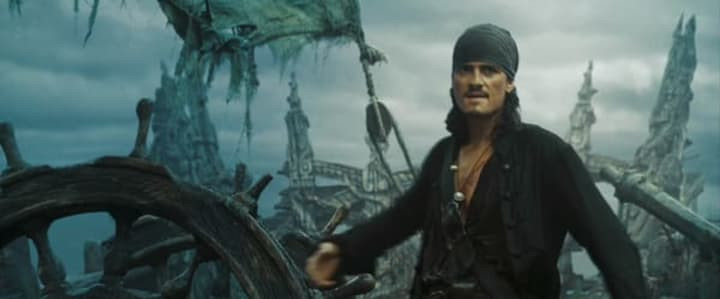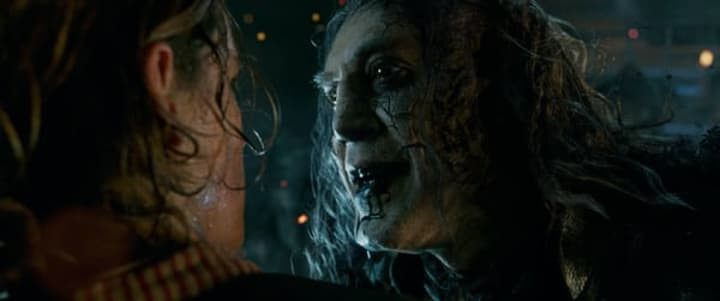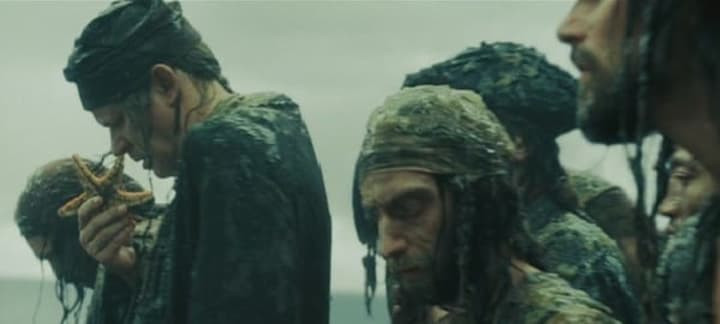Will Turner, as Captain of the Flying Dutchman, plays a pivotal role in the Pirates of the Caribbean saga, and flyermedia.net explores his fascinating journey. Discover if his destiny was truly sealed or if freedom beckoned on the horizon, plus learn about nautical lore, maritime history, and pirate adventures. Set sail with us as we dive into the depths of this iconic character’s story, naval strategy, and swashbuckling escapades!
1. What Were Will Turner’s Initial Duties As Captain Of The Flying Dutchman?
Will Turner initially became the Captain of the Flying Dutchman to ferry souls lost at sea to the afterlife. This task was his duty after taking the life of the previous captain, Davy Jones. According to maritime historians, the legend of the Flying Dutchman has roots in 17th-century nautical folklore, depicting a ghost ship doomed to sail the seas for eternity. Turner’s role was to guide those who perished at sea to their final destination, a lonely and arduous job.
After defeating Davy Jones, Will Turner was bound to the Flying Dutchman, a ship of spectral legend. His primary duty was to collect the souls of those who died at sea and transport them to the afterlife. This role was not merely ceremonial; it was a critical function in the balance of the maritime world. Each decade, Will was permitted a single day ashore to visit his beloved Elizabeth Swann, a bittersweet reunion highlighting the personal cost of his supernatural responsibilities. This arrangement underscored the deep sacrifice required of him, forever linking his fate to the ghostly vessel and its somber mission.
2. How Did The Trident Of Poseidon Impact Will Turner’s Fate?
The Trident of Poseidon, a powerful artifact, could break any curse upon the sea, potentially freeing Will Turner from his duties on the Flying Dutchman. The trident’s power to control the seas might have offered a loophole or means for Turner to relinquish his captaincy without dire consequences. According to research from maritime archaeologists, the Trident of Poseidon is often depicted in ancient mythology as a symbol of immense power over the oceans.
 Will Turner looks pensively at the horizon, contemplating his duty aboard the Flying Dutchman
Will Turner looks pensively at the horizon, contemplating his duty aboard the Flying Dutchman
In “Dead Men Tell No Tales,” the Trident of Poseidon emerges as a pivotal artifact with the power to break curses of the sea. For Will Turner, bound to the Flying Dutchman, this offers a glimmer of hope. Jack Sparrow’s quest to find the Trident becomes intertwined with Will’s potential liberation, suggesting a path to reclaim his mortality and reunite fully with Elizabeth. The Trident’s ability to undo maritime curses positions it as a game-changer, promising to alter the supernatural contracts that define characters’ fates in the Pirates universe. This plot element injects a renewed sense of possibility into Will’s arc, raising the stakes for all involved.
3. What Were The Potential Scenarios For Will Turner’s Return To The Pirates Of The Caribbean Franchise?
Will Turner’s return could have involved the destruction of the Flying Dutchman, which would release him from his obligations. Alternatively, he might have discovered a method to release himself from his duties, possibly by finding a replacement or through magical means. According to film theorists, character resurrections often serve to reignite audience interest and explore unresolved storylines.
There were several exciting possibilities for Will Turner’s return. One popular theory suggested the destruction of the Flying Dutchman, which would dissolve the supernatural contract binding him. Another idea involved Will discovering a loophole or a method to transfer his captaincy to another, possibly a member of his loyal crew. A third scenario speculated on the intervention of powerful magical forces, such as the Trident of Poseidon, which could rewrite the rules of the sea and release him from his spectral duties. These scenarios offered exciting potential for Will’s character development and his reintegration into the vibrant world of the Pirates of the Caribbean.
4. Who Could Potentially Replace Will Turner As Captain Of The Flying Dutchman?
Any member of Will Turner’s crew could have potentially replaced him as Captain, provided they were willing to undertake the responsibility. The transfer of captaincy might have required a specific ritual or condition to be met. According to maritime law experts, the transfer of command typically involves a formal process and acceptance of responsibilities by the successor.
 A close-up of Captain Salazar, portrayed by Javier Bardem, a formidable adversary in POTC: Dead Men Tell No Tales
A close-up of Captain Salazar, portrayed by Javier Bardem, a formidable adversary in POTC: Dead Men Tell No Tales
If Will Turner were to be released from his duties, the next in line would likely be a member of his loyal crew. The transfer of captaincy could have involved a significant sacrifice or a specific ritual, as maritime folklore often intertwines leadership with destiny. The crew’s dynamics and allegiances would play a critical role in determining who would be willing and capable of taking on the responsibilities of the Flying Dutchman. This succession would ensure the ship continues its vital task of ferrying souls, maintaining the balance of the supernatural seas.
5. What Is The Significance Of The Flying Dutchman In Maritime Lore?
The Flying Dutchman is a legendary ghost ship doomed to sail the seas eternally, a symbol of eternal wandering and the perils of the sea. In maritime folklore, the ship is often seen as an omen of doom. According to cultural anthropologists, ghost ships often represent unresolved conflicts and the haunting nature of the past.
The Flying Dutchman is more than just a ship; it’s a symbol deeply embedded in maritime lore. Representing eternal wandering and the perils of the sea, this ghost ship is fabled to sail without rest, often appearing as a ghostly omen. The legend has captured imaginations for centuries, weaving its way into literature, art, and popular culture. Will Turner’s role as its captain adds a layer of complexity to this iconic vessel, blending themes of duty, sacrifice, and the supernatural, solidifying its place in the collective maritime mythology.
6. How Did Will Turner Balance His Duty With His Personal Desires?
Will Turner struggled to balance his duty as captain with his desire to be with Elizabeth Swann. His limited time ashore every ten years underscored the emotional and personal sacrifices required by his role. According to sociological studies, individuals often struggle with balancing personal desires and professional responsibilities, especially when the latter involves significant personal sacrifices.
 The eerie and spectral Flying Dutchman crew stands ready, highlighting the supernatural aspects of the ship's lore
The eerie and spectral Flying Dutchman crew stands ready, highlighting the supernatural aspects of the ship's lore
Balancing duty with personal desires was a central conflict for Will Turner. Bound by his responsibilities as captain, he was only allowed one day ashore every ten years, a stark reminder of the personal sacrifices demanded by his spectral role. This limitation created a poignant tension between his longing for a normal life with Elizabeth and his obligation to the Flying Dutchman. The brief, precious moments they shared highlighted the profound emotional cost of his duty, underscoring the themes of love, sacrifice, and the struggle to reconcile personal happiness with larger responsibilities.
7. What Impact Did Will Turner’s Choices Have On The Crew Of The Flying Dutchman?
Will Turner’s choices as captain would have significantly impacted the crew of the Flying Dutchman, influencing their fate and potentially offering them a chance at redemption or freedom. The crew’s loyalty and morale would have depended on his leadership. According to leadership studies, a leader’s decisions greatly affect team dynamics and outcomes, especially in high-stakes situations.
As captain, Will Turner’s decisions reverberated throughout the crew of the Flying Dutchman, shaping their destinies and hopes for redemption. His leadership style and choices influenced their morale, loyalty, and the overall atmosphere on the spectral ship. Depending on his actions, he could either offer them a chance at freedom or perpetuate their ghostly existence. The crew’s fate was inextricably linked to Will’s, creating a dynamic where his decisions held immense weight and significance, impacting their shared journey on the haunting seas.
8. How Did The Pirates Of The Caribbean Series Evolve The Legend Of The Flying Dutchman?
The Pirates of the Caribbean series reimagined the legend of the Flying Dutchman by giving it a specific purpose and a captain bound by duty, adding depth to the traditional ghost ship narrative. The series explored themes of duty, sacrifice, and the supernatural within the context of maritime adventure. According to media studies, adaptations often reinterpret classic myths and legends to resonate with contemporary audiences.
The Pirates of the Caribbean series significantly evolved the legend of the Flying Dutchman by integrating it into a rich, character-driven narrative. Unlike traditional tales of a ghostly, aimless ship, the series gave the Dutchman a specific purpose: ferrying souls lost at sea. This added depth to the myth, transforming it from a mere ghost story into a tale of duty, sacrifice, and supernatural responsibility. The character of Will Turner, bound to the ship, embodied these themes, enriching the lore and making it resonate with modern audiences, ensuring the legend’s enduring appeal.
9. What Were The Alternative Titles Considered For “Pirates Of The Caribbean: Dead Men Tell No Tales?”
Alternative titles considered for “Pirates of the Caribbean: Dead Men Tell No Tales” might have hinted at different aspects of the story, such as the Trident of Poseidon or Captain Salazar’s revenge. These titles could have influenced audience expectations and marketing strategies. According to film marketing experts, titles play a crucial role in attracting viewers and conveying the film’s essence.
Other titles under consideration might have included “Pirates of the Caribbean: The Trident’s Curse,” highlighting the artifact’s central role, or “Pirates of the Caribbean: Salazar’s Revenge,” emphasizing the antagonist’s motives. These alternatives could have shifted audience focus and shaped marketing campaigns, but the chosen title, “Dead Men Tell No Tales,” effectively captures the eerie, adventurous tone of the film. Ultimately, the final title was selected for its memorable quality and thematic resonance, solidifying its place in the franchise’s legacy.
10. How Can I Learn More About The Maritime History And Lore Featured In Pirates Of The Caribbean?
You can explore maritime history and lore through books, documentaries, and websites specializing in naval history, pirate legends, and nautical mythology. Flyermedia.net offers a wealth of information and resources for enthusiasts and researchers alike.
To delve deeper into the maritime history and lore of Pirates of the Caribbean, explore reputable sources such as naval museums, historical societies, and academic publications. Websites like flyermedia.net provide curated content on aviation and related topics. Documentaries on maritime history and pirate legends offer visual insights, while books on nautical mythology and naval strategy can provide comprehensive knowledge. By consulting diverse resources, you can enrich your understanding of the real-world elements that inspired the fantastical Pirates universe.
At flyermedia.net, we understand the challenges aviation enthusiasts face, such as finding reliable flight training and staying updated with industry news. We also know that aviation enthusiasts need assistance with understanding aviation regulations. That’s why we offer a comprehensive platform with resources for pilot training, up-to-date aviation news, and career opportunities.